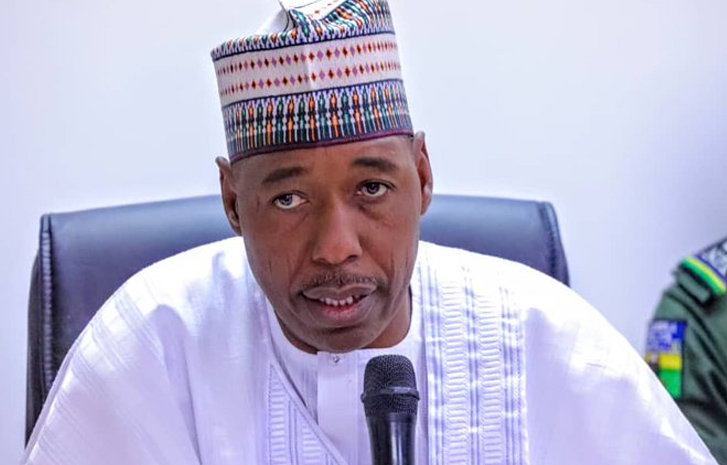It was the penultimate week that I ran a column with more or less a similar heading. A pity that we return to the same issue because the woes afflicting Maiduguri have not gone away and could be said to multiply. That same Monday, two weeks ago, electricity was restored to Maiduguri after about 10 weeks of darkness.
There was jubilation all over the city with a mileage of social media footage of happy citizens singing, clapping and dancing in the streets. Unfortunately, this celebration turned out to be a misplaced revelry, as a short time after the terrorists returned to mine and blow up a few more towers in the transmission line and throw Maiduguri into another round of darkness.
- IPOB kills 13 northern traders in Enugu, Imo in one week
- Ex-gov Idris, Jelani, 18 others bag traditional titles in Sokoto
The city enjoyed only a brief, two days of electricity before relapsing into a fresh period of darkness. It was one of the worst shows of impunity by the Boko Haram terrorists – their show of strength and capacity to cause maximum discomfort plus the extent they are ready to go to cripple social and economic activities in Maiduguri and the entire North East region in general. In many ways, that dastardly act exposed the vulnerability of the transmission line, an important national asset that due to its peculiar placement is difficult to secure and protect. Fixed on towers and linked onto poles running over kilometres through large expanses of land, much of it unoccupied, this important national asset becomes a sitting duck for these inhuman terrorists to take potshots at.
We all are at the cross-roads now, the citizens and the government alike. Maiduguri is in darkness now, as it has been in the last many weeks and from the look of things might drag on for a long while. Anyone that had lived in Maiduguri would tell you that April is one of the hottest months in the environment. And when you contemplate that the hot season this year coincides with the observance of the Ramadan fast, you would easily see the kind of irritability the Maiduguri citizen would undergo without the aid of electricity. There might have to be a lot of souls searching to arrive at a workable solution that would secure the transmission lines and this would probably have to involve the combined strengths of both our military and the communities along the path of the transmission line.
While we are at this soul searching stage, the country had the misfortune of losing one of its prized military equipment, an Alpha Jet, in action against the terrorists in Sambisa forests. And to worsen matters, the insurgents had the propaganda upper hand as they videoed themselves at the site of the crash when the jet was actually burning. It was a sordid kind of video that did not even show compassion for the gallant pilots that went down with the jet.
Due to the difficulties of securing the transmission lines (both Damaturu and Damboa lines) stakeholders had been engaged in wholesome debates in social media on alternatives that can deliver protected electricity to Maiduguri and other settlements in the state. I was privileged to eavesdrop on one of them and can share with the readers one of the compelling submissions by Professor Usman Tar of the Nigerian Defence Academy. He wrote:
“The Boko Haram has just discovered an easy way to sabotage our existence. It is cheap to blow up a power transmission line whilst restoration takes long. We are probably in for a long haul of blackout. The vicious circle of blow-up-and-restore power infrastructure is shaping up to be a permanent feature of the insurgents’ battle plan, and a profane ‘new norm’ that we cannot bear. Terrorists feast on sabotage and blackmail as a means of triggering public anger.
“Government should show to the insurgents, loud and clear, that we reserve the collective will to overcome terror and prosper, to the frustration of the agents of terrorism. I suggest a dual master plan:
“1. Cosmopolitan Power Plan. Government should consider establishing a secure hybrid Mega solar and gas power plant for Maiduguri, Bama, Biu and the environs. This plant should have sufficient capacity to power residential and industrial needs.
“2. Rural Power Plan. Government should consider establishing secure mini hybrid power plants at LGAs to service the LG HQ and adjacent villages. These plants should serve the needs of SMEs, cottage industries and communities.
“These plants, to be domiciled in the well-fortified state capital and LG HQs, should be secured in more efficient and sustainable ways than the ‘exposed’ national power grids that pass through the vast territory and ‘ungoverned spaces’
“This initiative can be funded through sukuk loan or PPP. In addition, the government can negotiate a smooth take off with the TCN and DisCos who, it would seem, lack the will or resources to embark on such a capital project. At the end of the day, there is no alternative to a sustainable solution that will counter the nefarious intent of the insurgents.
“The necessary legislative, institutional and budgetary structures should be secured to commence this. The time for urgent action is now. The earlier this matter is given consideration, the better for us in calling the bluff of the insurgents. May Allah grant us the collective will to overcome this challenge, as we have done since the start of this madness called BH insurgency.”

 Join Daily Trust WhatsApp Community For Quick Access To News and Happenings Around You.
Join Daily Trust WhatsApp Community For Quick Access To News and Happenings Around You.


